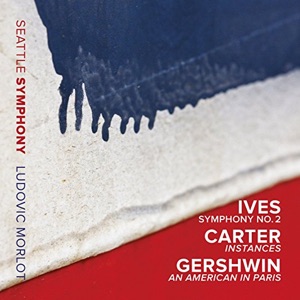This is one of those collections that makes a point more theoretical than musical–three facets of 20th century American music–but do they make an attractive program? Not really. Certainly there’s nothing wrong with the performances as such. The Ives has plenty of spirit, nicely contrasted tempos between movements, and I do like the way Morlot hangs on to that last chord, as Bernstein used to do. I wish the applause had been edited out at the end–it’s annoying.
Carter’s Instances is his last orchestral piece. The title, typically, is meaningless, and the music probably is too. The composer, of course, was a master who knew what he wanted and how to get it, but as time goes on I can’t help but think that the exercise sounds increasingly pointless–like the last gasp of the bankrupt and sclerotic academic avant-garde. I doubt that many will miss it.
The Gershwin, though, is a surprise: perhaps a touch on the slow side in spots, but on the whole a stylish and very enjoyable performance. I know there may be people out there who enjoy Gershwin and Carter (and Ives) equally, and these self-produced discs don’t necessarily have to be made with sales in mind. Hell, I’m not sure any recordings are made today with sales in mind, but it would still be nice to see the notion given more thought. For specialists only, then…both of them.
































